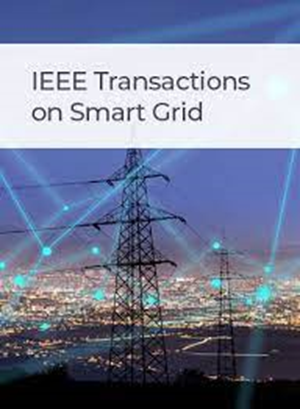基于异常观测器的风力涡轮机网络韧性转矩控制,对抗混合攻击
IF 9.8
1区 工程技术
Q1 ENGINEERING, ELECTRICAL & ELECTRONIC
引用次数: 0
摘要
受可再生能源网络安全问题持续受到关注的启发,本文旨在为风力涡轮机提出一种网络弹性扭矩控制框架,以抵御混合攻击。本文建立的网络威胁模型结合了拒绝服务攻击和数据篡改攻击,试图通过攻击从转子速度传感器到控制器的通信链路来破坏风力涡轮机系统的稳定性。特别是,分析了混合攻击的影响,将其分为两种情况,并制定了相应的补偿措施。为减轻混合攻击的影响并稳定风机系统,提出了一种结合零阶保持器和异常观测器的网络抗干扰转矩控制方案,该方案对风机系统的计算能力要求较低。利用 Lyapunov 理论,保证了最佳转子速度跟踪的控制目标,并推导出了所提方法下的可容忍攻击范围。对基于感应发电机的 1.5 MW 双馈风力涡轮机进行了广泛研究,仿真结果表明,所提出的控制策略可有效降低混合攻击造成的影响。本文章由计算机程序翻译,如有差异,请以英文原文为准。
Anomaly Observer-Based Cyber-Resilient Torque Control Against Hybrid Attacks in Wind Turbines
Inspired by the continued focuses on renewable energy cybersecurity issues, this paper aims to propose a cyber-resilient torque control framework for wind turbines to defend against the hybrid attack. The cyber threat model is established combining denial-of-service and data manipulation attacks, which attempts to destabilize the wind turbine system by implementing the attacks on the communication link from the rotor speed sensor to the controller. Particularly, the impact of hybrid attack is analyzed and classified into two cases, and the corresponding compensatory measures are developed. To mitigate the impact of the hybrid attack and stabilize the wind turbine system, a cyber-resilient torque control scheme combining zero-order holder and anomaly observer is proposed, which requires simple computational ability of the wind turbine system. Using the Lyapunov theory, the control target of optimal rotor speed tracking is guaranteed and the tolerable attack range under the proposed method is derived. Extensive studies are carried out on a 1.5 MW doubly-fed induction generator-based wind turbine, and the simulation results indicate that the proposed control strategy could effectively reduce the impacts caused by the hybrid attack.
求助全文
通过发布文献求助,成功后即可免费获取论文全文。
去求助
来源期刊

IEEE Transactions on Smart Grid
ENGINEERING, ELECTRICAL & ELECTRONIC-
CiteScore
22.10
自引率
9.40%
发文量
526
审稿时长
6 months
期刊介绍:
The IEEE Transactions on Smart Grid is a multidisciplinary journal that focuses on research and development in the field of smart grid technology. It covers various aspects of the smart grid, including energy networks, prosumers (consumers who also produce energy), electric transportation, distributed energy resources, and communications. The journal also addresses the integration of microgrids and active distribution networks with transmission systems. It publishes original research on smart grid theories and principles, including technologies and systems for demand response, Advance Metering Infrastructure, cyber-physical systems, multi-energy systems, transactive energy, data analytics, and electric vehicle integration. Additionally, the journal considers surveys of existing work on the smart grid that propose new perspectives on the history and future of intelligent and active grids.
 求助内容:
求助内容: 应助结果提醒方式:
应助结果提醒方式:


